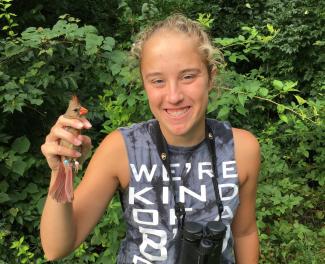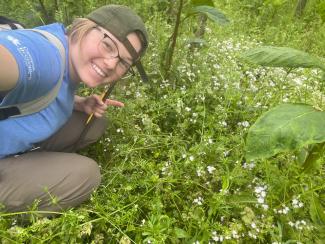Undergraduates can undertake a research project using EREC as part of the BIO 395 or 398 courses. Interested students should consult the main Biology web page regarding BIO 395/398 to learn how to proceed, and check with a potential mentor if a field experience is desired.
Opportunities
Independent Study (BIO 395/398)
The Funkhouser Summer Internship
The Funkhouser Summer Internship is available to undergraduates at the University of Kentucky who would like to gain an intensive research experience. It provides a stipend for students who will work with an advisor and do research, 30% or more of which must be done at the EREC field station. Funded by the Funkhouser Endowment attached to the Department of Biology, this experience is especially valuable to students with a potential interest in graduate work in some area of Biology. The application process is advertised each Spring semester, with a due date typically near the end of March each year. For more information, contact the Director of EREC.
2021 Summer Intern Grace Earl
Grace Earl was the 2021 Funkhouser Summer Intern and completed a project on "Parental Care and Female Vocalizations in Northern Cardinals". She surveyed EREC for breeding cardinals, found their nests, and video recorded parents attending eggs and nestlings, focusing on the contexts for when parents, especially females, vocalized to their mates while at the nest in order to understand pair coordination of parental care. Grace graduated and has entered medical school.

Grace Earl
Grace holds a female cardinal recently banded
David Westneat
2023 Summer Interns
Harrison York undertook a project entitled, "The effects of management for invasive plant species on the nesting success of Northern Cardinals on a rural-urban gradient", for which he collected several measures of Northern Cardinal breeding success at EREC, on UK's Campus, and in the UK Arboretum. The goal was to better understand how differences in human management of habitat influenced breeding performance. He found no differences between sites in egg mass or clutch size, but nestlings grew more quickly at the Arboretum and did less well at EREC. Harrison has graduated and is in a graduate program at the University of Nevada-Reno.
Skylar Gillies undertook research entitled, "Assessing Floral Abundance and Nectar Depletion Rates in a Kentucky Wildflower Community". She surveyed flowering plants and their pollinators at the EREC station. She uncovered seasonal changes in floral density and the rates with which pollinators, primarily insects, depleted nectar resources.

Skyler Gillies
Skyler with nectar producing flowers
Skylar Gillies
2024 Summer Interns
Allison Chavez completed a project entitled “Assessing Patterns of Richness and Abundance of Tree-growing Lichens in Central
Kentucky”. She surveyed lichens present at EREC and Floracliff Nature Preserve to better understand the role of urbanization on lichen abundance and diversity.
Dexter Vilt continued a research project entitled, "Differences in breeding performance of Northern Cardinals across three urban sites with different habitat types" in which he conducted a comparison of Northern Cardinal breeding success at EREC, on campus, and at the arboretum. With refined methods, he found nests, tracked clutch and egg size, hatching success, nestling growth, and fledging success. He confirmed that the Arboretum Cardinals had faster growth rates and higher nest success than at the other sites.